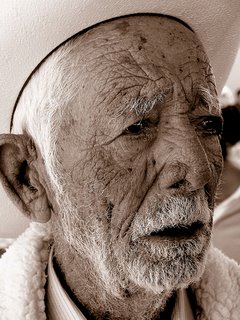 He is known as el Abuelo Juan.
He is known as el Abuelo Juan.We refer to him as, "Mi Abuelo"
Mexicans do that, we refer to our parents, grandmothers, grandfathers as "my mother, my grandfather". We don't mean to be inconsiderate of our brothers or sisters. Its just a cultural thing, its a quirk in our use of language.
I worry about Mi Abuelo. I worry about his health, does he eat right, does have and take his medicine. I worry and wonder when I will see him again. I fear whether he will still be, with us, when I return.
Our days apart turn into months, months into years and we miss him each other. Another year goes by and I've yet to see him. How I yearn to hear his voice. I place the call. Hello. Abuelito. Si..! "Como esta"? Bien mijo...y tu? Fine my son, and you? Bien. Bien. Good. Good.
We talk of "Los Estados Unidos", the United States, of "el otro lado" the otherside. He likes to retell stories, stories of his past journeys to California, Arizona and Oregon. Journeys to places he can't pronounce, "Aidajo, Weesconson, Meechican" and the tough and dirty work in the farm fields.
I tell him about the difficult times Mexicans are now facing in the U.S. He tells me of his time as a "Bracero", as a guest worker. He tells me of the unscrupulous employers who vanished with weeks of pay. He remembers the money taken from his paychecks, for "pension" a 10% withholding from his earnings during the period of 1942 to 1945. How these funds were withheld by the U.S. government, the money to be placed in a "savings fund". The funds were to be paid to the guest workers upon their return to Mexico. His "savings funds" disappeared like those of 300,000 other Braceros never to resurface and neither the U.S. nor the Mexican government willing to take any responsibility. The Braceros left with no recourse and no one to turn just went on and let it go and now can only remember.
But, for all that, my Abuelo insists his journey and time in America was good. He speaks of the kindness of many "Americanos". The kindness of the white Los Angeles policeman who stopped him on a residential street, questioned him in bits of broken Spanish and then just reached into his pocket pulled out a Twenty Dollar bill, placed the bill into my grandfathers hand and said, "vaya con Dios, amigo". He relishes the memory and generosity of a "Mister Ford" who he says once helped him land a good paying job in factory. The factory job took him out of the farm fields and out of the blazing sun.
My Abuelo says, "Fueron buenos tiempos, fue una aventura y lo haria otra vez, pero eso es cosa para los nuevos". They were good times, it was an adventure, I would do it again, but those are things for when you are young.
Abuelo says Goodbye to me. He tells me, "Ojala pronto los vea." Hopefully I'll see you soon. Before I can speak, I feel a lump in my throat and as tears well in my eyes I say, "Si.. Abuelito. Pronto. Muy pronto". Yes, Grandfather, Soon. Very soon.
Technorati Tags: immigration cultural heritage migration mexico family




No comments:
Post a Comment